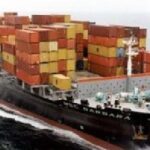See the Huge Millions of Dollars that Maritime Corruption Costs Nigeria Annually – Report
See the Huge Millions of Dollars that Maritime Corruption Costs Nigeria Annually – Report
By Anozie Egole

Maritime ship
A recent report from the Maritime Anti-Corruption Network (MACN) reveals that Nigeria loses approximately $204 million annually in GDP due to maritime corruption.
The Copenhagen-based organization, which includes about 200 maritime-industry members, released a report titled “The Cost of Maritime Corruption to the Industry and Society.” The report highlights that the prevalence of bribery demands in the maritime sector has resulted in the country having 235,000 fewer full-time jobs.
MACN’s analysis suggests that maritime corruption adds about $160 million per year to the cost of bulk and food product shipments in Nigeria, with an additional $150,000 to $180,000 per shipment. This extra expense represents a 15% increase in transport and logistics costs for crucial imports, which is ultimately passed on to the private sector, leading to a 2% price increase for the average Nigerian family.
“This situation reduces consumption and sales, negatively impacting GDP, customs revenue, and job creation,” the report stated. It further detailed that maritime corruption results in an annual $204 million reduction in GDP, a $42 million drop in customs revenue, and 235,000 fewer full-time equivalent jobs due to decreased sales and economic activity.
The costs associated with maritime corruption include higher insurance premiums for voyages, additional demurrage charges during port delays, and cash payments at police checkpoints during drayage. These expenses compel Nigerian retailers to maintain extra stock to avoid shortages during shipment delays, increasing the overall cost of doing business in the country.
With 63% of Nigerians, or 133 million people, classified as multidimensionally poor, increased import costs due to corruption are likely to reduce household demand and make essential goods less affordable. Corruption adds $147,000 per grain shipment and over $187,000 per petrol shipment, with food and petrol accounting for about a third of Nigeria’s imports.
The MACN report suggests that adopting a zero-tolerance approach to bribery during vessel clearance could reduce the economic impact of corruption by around 62%, cutting approximately $114,000 per shipment in corruption costs. This could lead to a $100 million annual reduction in the maritime corruption bill and a $230 million decrease in its economic impact.
Eliminating maritime corruption could result in a $130 million annual increase in GDP, a $28 million rise in customs revenue, and the creation of over 147,000 full-time jobs due to increased sales and economic activity across Nigeria’s supply chain.
Significant progress has been made in reducing corruption within Nigeria’s port sector through the combined efforts of industry commitment and proactive government measures. Before 2019, resolving a single bribery case could take seven to ten days, but current data shows that over 90% of corruption incidents are now resolved within 24 hours by relevant government agencies. Impressively, 98% of escalated incidents have been successfully resolved, with the remaining 2% escalated to authorities for protocol clarification.
Established in 2011 by a small group of dedicated maritime companies, MACN has grown to include over 200 companies globally, becoming a leading example of collective action against corruption. In Nigeria, MACN has been implementing a collective action initiative since 2012, partnering with the private sector, the Nigerian government, and the Convention on Business Integrity to combat corruption and improve the operational environment in the port sector.
TRENDING SONGS
 Shock in Anambra: Bride Disappears Moments Before Wedding
Shock in Anambra: Bride Disappears Moments Before Wedding
 Nigerian Woman Returns ₦330 Million Accidentally Credited to Her Account
Nigerian Woman Returns ₦330 Million Accidentally Credited to Her Account
 APC Don Reach Morocco?’ VeryDarkMan Reacts to Seyi Tinubu Poster
APC Don Reach Morocco?’ VeryDarkMan Reacts to Seyi Tinubu Poster
 Bride Breaks Down in Tears as Wedding Meals Were Kept Secretly While Guests Go Home Hungry
Bride Breaks Down in Tears as Wedding Meals Were Kept Secretly While Guests Go Home Hungry
 Odogwu by Day, Robber by Night: How Marriage Joy Turned Into Tragedy
Odogwu by Day, Robber by Night: How Marriage Joy Turned Into Tragedy
 Nigerian Officials Allegedly Pocket N4–6B Weekly Through Smuggling Cartels at Seme–Badagry Border
Nigerian Officials Allegedly Pocket N4–6B Weekly Through Smuggling Cartels at Seme–Badagry Border
 Ahmad Yerima: Naval Officer to Face No Sanctions After Clash with Wike – Matawalle
Ahmad Yerima: Naval Officer to Face No Sanctions After Clash with Wike – Matawalle
 Trending Video: Muslim Man Joins Wife in Hallelujah Challenge ‘Dress Like Your Miracle’ Night
Trending Video: Muslim Man Joins Wife in Hallelujah Challenge ‘Dress Like Your Miracle’ Night
 Woman Seeks Advice as Late Brother’s Wife Refuses to Mourn Him Following His Death With Alleged Mistress
Woman Seeks Advice as Late Brother’s Wife Refuses to Mourn Him Following His Death With Alleged Mistress
 Nobody Cares About Fine Girls In The UK, I Miss Nigeria — Nigerian Lady Laments
Nobody Cares About Fine Girls In The UK, I Miss Nigeria — Nigerian Lady Laments
Share this post with your friends on ![]()













